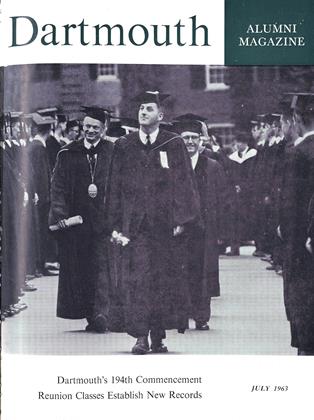Edited by William H. Davenport '29. New York: Macmillan, 1962. 564 pp. $7.00.
Doctors, like eggs, it is said, are never poor - they are either good or bad. This book is an anthology of essays by, or about, the good - some exemplary physicians revered not just by the profession but by the rest of mankind as well. In fact, this book is unashamedly a tribute to the medical profession. Professor Davenport has already provided us with an anthology of legal literature, the very successful Voices in Court, and with the present volume he is extending his interest in the relationship between literature and the professions.
So broad a field invites a great many possibilities for inclusion in any such collection, and it will be a rare reader who does not look in vain for one of his favorites. But The Good Physician is a catholic and representative sampling which will provide good reading for anyone interested in the field of medicine and its practitioners.
There are nine major headings in this book, each of which includes about half a dozen different essays. There are sections on great discoverers, on the early days, on medical ethics, on medical students, on the patient, and on the doctor and literature. Authors have been selected from among the great names in medicine, men like Stephen Paget and William Osier and Harvey Crushing, writing on diverse things but all medical; then there are representative authors from that fascinating galaxy of physicians whose immortal fame rests on achievements outside the field of medicine, O. W. Holmes, Somerset Maugham, William Carlos Williams, and Albert Schweitzer. So too the selections about doctors cover not only great contributors to their profession like Harvey, Withering, Jenner, and Pasteur, but also Chekhov and Smollett. The less personal subjects range from an essay on medical jargon by Sir Ernest Gowers to an excerpt from "The Plague" by Albert Camus.
This book is bound to interest all who pick it up. It may well provoke many to read further on the subjects it so briefly introduces. In any case it is a delightful and rewarding anthology.
One can't help musing over the possibility that Professor Davenport might one day give us this book's complement, a collection on THE BAD PHYSICIANS — on Dover, Brown, and Brinkley, for example; and on the doctor as seen by his severer critics, Moliere, LeSage, and Shaw. That would be a lively lot of rascals and good reading too.
 View Full Issue
View Full Issue
More From This Issue
-
 Feature
FeatureThe Second Emancipation
July 1963 By THE REV. JAMES H. ROBINSON, D.D. '63 -
 Feature
FeatureHONORARY DEGREE CITATIONS
July 1963 -
 Feature
FeatureThe Alumni Council's 50th Year
July 1963 -
 Feature
FeatureThe Past Is Prologue
July 1963 By T. DONALD CUNNINGHAM '13 -
 Feature
FeatureA Record-Breaking Reunion Week
July 1963 -
 Feature
FeatureThe Honesty That Is Dartmouth
July 1963 By ALAN KENNETH PALMER '63
Books
-
 Books
BooksFaculty Publications
November 1934 -
 Books
BooksL.P. HARTLEY.
JUNE 1964 By CHAUNCEY C. LOOMIS JR. -
 Books
BooksECONOMIC DEVELOPMENT AND AMERICAN FOREIGN POLICY 1943-62.
FEBRUARY 1967 By HOWARD BLISS -
 Books
BooksRADIATION THERAPY IN THE MANAGEMENT OF CANCER OF THE UTERINE CERVIX
October 1951 By Leslie K. Sycamore, M.D., '25 -
 Books
BooksTEN APPLES UP ON TOP!
June 1961 By MAUDE D. FRENCH -
 Books
BooksPROFITS ON HORSES.
June 1937 By Paul S. Allen '26


